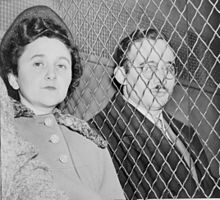
Back جوليوس وإيثل روزنبرغ Arabic Ethel i Julius Rosenberg Catalan Julius a Ethel Rosenbergovi Czech Юлиус тата Этель Розенбергсем CV Julius og Ethel Rosenberg Danish Ethel und Julius Rosenberg German Τζούλιους και Έθελ Ρόζενμπεργκ Greek Ethel kaj Julius Rosenberg Esperanto Ethel y Julius Rosenberg Spanish ژولیوس و اتل روزنبرگ Persian
Julius and Ethel Rosenberg | |
|---|---|
 Ethel and Julius Rosenberg in 1951 | |
| Born |
|
| Died |
|
| Cause of death | Execution by electrocution |
| Resting place | Wellwood Cemetery, New York, U.S. |
| Criminal status | Executed (June 19, 1953) |
| Children | |
| Conviction(s) | Conspiracy to commit espionage (50 U.S.C. § 32) |
| Criminal penalty | Death by electrocution |
Julius Rosenberg (May 12, 1918 – June 19, 1953) and Ethel Rosenberg (née Greenglass; September 28, 1915 – June 19, 1953) were an American married couple who were convicted of spying for the Soviet Union, including providing top-secret information about American radar, sonar, jet propulsion engines, and nuclear weapon designs. Convicted of espionage in 1951, they were executed by the federal government of the United States in 1953 at Sing Sing in Ossining, New York, becoming the first American civilians to be executed for such charges and the first to be executed during peacetime.[1][2][3][4] Other convicted co-conspirators were sentenced to prison, including Ethel's brother, David Greenglass (who had made a plea agreement), Harry Gold, and Morton Sobell. Klaus Fuchs, a German scientist working at Los Alamos Laboratory, was convicted in the United Kingdom.[5][6] For decades, many people, including the Rosenbergs' sons (Michael and Robert Meeropol), have maintained that Ethel was innocent of spying and have sought an exoneration on her behalf from multiple U.S. presidents. [7]
Among records the U.S. government declassified after the fall of the Soviet Union are many related to the Rosenbergs, included a trove of decoded Soviet cables (code-name Venona), which detailed Julius's role as a courier and recruiter for the Soviets. In 2008, the National Archives of the United States published most of the grand jury testimony related to the prosecution of the Rosenbergs.[8] Freedom of Information Act (FOIA) requests filed about the Rosenbergs and the legal case against them have resulted in additional U.S. government records being made public, including formerly classified materials from U.S. intelligence agencies. In September 2024, a new document was released in response to a FOIA request filed by the couple's sons: written a week after Ethel's arrest by the National Security Agency's chief decryptor and analyst, this 1950 memo provides an analysis of the decrypted Soviet Union intelligence on Julius and Ethel, reviewing Julius' spying activities and codenames, and concluding that Ethel was not engaged in espionage work for the Soviet Union. [9]
- ^ Radosh, Ronald (June 10, 2016). "Rosenbergs Redux". Archived from the original on July 3, 2016. Retrieved October 5, 2016.
- ^ "What the K.G.B. Files Show About Ethel Rosenberg". The New York Times. August 13, 2015. Archived from the original on November 7, 2016. Retrieved February 10, 2017.
- ^ Radosh, Ronald; Klehr, Harvey; Haynes, John Earl; Hornblum, Allen M.; Usdin, Steven (October 17, 2014). "The New York Times Gets Greenglass Wrong". Weekly Standard. Archived from the original on June 12, 2018. Retrieved October 5, 2016.
- ^ "Julius Rosenberg and Ethel Rosenberg". Encyclopædia Britannica. Encyclopædia Britannica, Inc. 2020. Archived from the original on October 19, 2020. Retrieved October 18, 2020.
- ^ Ranzal, Edward (March 19, 1953). "Greenglass, in Prison, Vows to Kin He Told Truth about Rosenbergs". The New York Times. Archived from the original on February 5, 2017. Retrieved July 7, 2008.
David Greenglass, serving 15 years as a confessed atom spy, denied to members of his family recently that he had been coached by the Federal Bureau of Investigation in the drawing of segments of the atom bomb.
- ^ Whitman, Alden (February 14, 1974). "1972 Death of Harry Gold Revealed". The New York Times. Archived from the original on May 28, 2023. Retrieved July 7, 2008.
Harry Gold, who served fifteen years in Federal prison as a confessed atomic spy courier, for Klaus Fuchs, a Soviet agent, and who was a key Government witness in the Julius and Ethel Rosenberg espionage case in 1951, died 18 months ago in Philadelphia.
- ^ "Exonerate Ethel". Rosenberg Fund for Children. Archived from the original on September 29, 2024. Retrieved September 30, 2024.
{{cite web}}:|archive-date=/|archive-url=timestamp mismatch; June 23, 2024 suggested (help);|archive-url=is malformed: flag (help) - ^ "National Archives of the United States of America". National Archives Catalog. National Archives and Records Administration. Archived from the original on December 3, 2022. Retrieved December 3, 2022.
- ^ Eric Tucker. "Declassified documents shed light on Ethel Rosenberg's involvement in her husband's Cold War spy case". Associated Press. Archived from the original on September 30, 2024. Retrieved September 29, 2024.